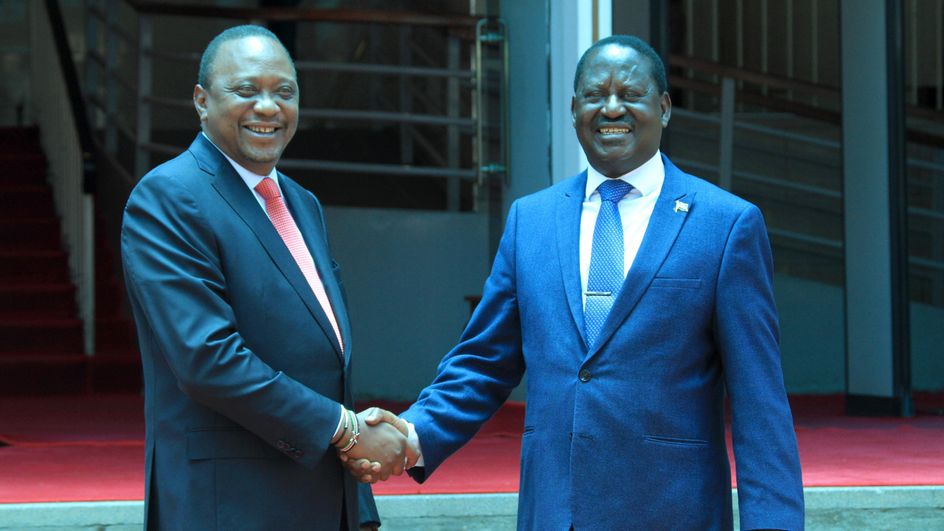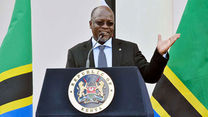
On March 9, 2018, President Uhuru Kenyatta shook hands with his then bitter foe Raila Odinga on the steps of Harambee House, kick-starting a process that has fundamentally altered Kenya’s politics.
It has been 845 days since, and the storm that shocked friends and foes has just refused to pass.
It has stayed on, increasing its intensity, with clear signs that it might withstand the test of time to the 2022 General Election.
The historic event, which Mr Odinga previously likened to the handshake between peace icon Nelson Mandela and apartheid government head Frederik de Klerk in 1990, has tamed the opposition, making Mr Odinga a powerful insider in the government he fought so hard to remove from office.
Deputy President William Ruto, on the other hand, has turned from President Kenyatta’s heir apparent and arguably the country’s most powerful second in command in history to an unwanted outsider scrambling to save his fast-fading influence in the government he helped form.
“Kenya doesn’t need any kingship, bravado and conmanship. Leaders must be ready to listen to both the [meek] and weak. We must be ready to build genuine bridges and avoid ongoing political infighting and chest-thumping,” Dr Ruto famously said in March this year, a position he’s held since the hatching of the Handshake.
When Mr Kenyatta and Mr Odinga shook hands, the two leaders told a deeply divided nation that the Handshake was to address ethnic antagonism, lack of a national ethos, inclusivity, strengthening devolution, ending divisive elections, ensuring safety and security for Kenyans, ending corruption and ensuring shared prosperity.
And as the term of the Garissa Senator Yusuf Haji-led Building Bridges Initiative (BBI) Steering Committee ended yesterday, questions abound on the progress that has been made on the nine points the two leaders said were key to a more progressive, united Kenya.
“The Steering Committee has successfully conducted validation of the task force report through consultations with citizens, civil society, faith-based organisations, cultural leaders, the private sector and experts; and has proposed administrative, statutory or constitutional changes that may be necessary in the implementation of the recommendations of the task force, taking into account any relevant contributions made during the validation period,” the committee’s joint secretaries Paul Mwangi and Martin Kimani said in a statement.
Mr Mwangi and Mr Kimani said the report was ready and that the committee was ready to submit it to the President.
Mr Odinga recently underwent surgery in Dubai while President Kenyatta’s State House is under lockdown after Covid-19 cases were confirmed among staffers, both of which might delay the presentation of the report.
Yesterday, Mr Caleb Kositany, Jubilee Party deputy secretary-general, and the de facto Ruto spokesperson, said the Handshake had rolled back the gains that had been made.
“Since the Handshake, we have definitely achieved a lot, but on the negative side. What we have now is dictatorship, the continued muzzling of divergent views, the death of the opposition, and a one-side unquestioning Parliament,” the Soy MP said, summarising what has been the DP’s issue with the camaraderie.
President Kenyatta has led the removal of Dr Ruto-allied MPs in parliamentary leadership posts, replaced by loyal MPs, with talks of committee reorganisation that will award committee chairmanship to Raila-allied MPs, further smoothening the way for a parliamentary-led process of getting to a referendum, and passing changes that will be critical to the 2022 contest.
“We are nowhere near where we were told we would be. We have slid back on the many gains we had made, and we now have a divided, more suspicious nation in the place of a cohesive, united one we were told we will have,” Mr Kositany argued.
The Handshake has also yielded unlikely allies in the Odinga-led National Super Alliance (Nasa) ‘orphans’ — the Amani National Congress (ANC) and Ford-Kenya — which are now facing an emboldened Uhuru-Raila alliance.
ANC secretary-general Barrack Muluka faulted the Handshake, saying it had created more divisions instead of being the uniting factor it was meant to be.
“There are people who just say unity on their lips, but are very divisive. While President Kenyatta has embraced Mr Odinga in a unity move, the Handshake has deeply divided Jubilee,” Mr Muluka said.
Political analyst Javas Bigambo said it was ridiculous that the BBI process was only going to get serious after the tabling of the report.
“On inclusivity, just look at the most recent appointments and ask yourself: Just how national are they? Jubilee has engaged in doublespeak on the fight against corruption and it is easy to conclude that there is a game going on with sacred cows on one side and others who are pursued because of their political affiliations,” Mr Bigambo said.
For Mr Odinga, the Handshake had provided Nasa, the coalition he led to the polls in 2017, with an opportunity to address some of the things it said it wanted to address when it pushed for dialogue, after opting out of a repeat election following the nullification of President Kenyatta’s August 8, 2017 election win.
While lauding the Handshake, Kenya Association of Manufacturers chief executive officer Phyllis Wakiaga asked leaders to focus more on predictable policies that could drive industrial development and economic growth.
“The country needs to focus on issue-based politics that work for all citizens. Our leaders can focus on sectoral priorities such as creating a massive export push, raising productivity to world-class standards, promoting and leveraging ‘Buy Kenya Build Kenya’, tackling un-customed goods and counterfeits, and developing a stable policy environment,” Ms Wakiaga said in an email response to the Nation.
Ms Wakiaga also said Kenya should focus on addressing corruption “decisively and comprehensively”, raising productivity and reducing the high cost of living by reducing input costs in sectors like wheat and maize, controlling interest rates to ensure access to credit, hastening the renewal of land leases and providing affordable, good-quality and consistent energy.
National Assembly Minority Whip Junet Mohamed, an Odinga confidant who was one of the few that accompanied him to Harambee House in the March 2018 meeting, said Kenya is “definitely at a much better place” after the Handshake.
“In BBI, Kenya has had more than two years of peace, progress, national unity and national harmony. Even before the report comes, much of what the two leaders sought to achieve has been achieved already,” he said.
Nyeri Town MP Ngunjiri Wambugu provided a summary of the achievements of the Handshake on some of the nine points.
The vocal MP, who is allied to President Kenyatta, praised efforts to support devolution, saying the administration has upped its fight against corruption and citizens are now allowed to talk freely on national discourses.
Senate Minority Whip Mutula Kilonzo Jr recently described the Covid-19 pandemic as a blessing in disguise, saying the BBI rallies that were going on just before the pandemic struck were “poisoning the process”.




